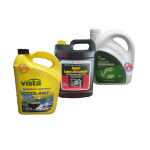Table of Contents
The oil filter in an automobile engine plays a crucial role in maintaining engine health and performance. Its primary function is to remove contaminants and impurities from the engine oil as it circulates through the system. Here are the key functions of an oil filter:
Contaminant Removal:
The oil filter traps and removes contaminants such as dirt, metal particles, sludge, and carbon deposits that can accumulate in the engine oil over time. These contaminants can be harmful to the engine and cause increased wear and tear if not removed.

CLOG OIL FILTER
Engine Protection:
By capturing and removing contaminants, the oil filter helps to protect vital engine components from damage. It prevents abrasive particles from circulating in the oil and potentially causing scratches or abrasion on surfaces such as cylinder walls, pistons, and bearings.
Extended Oil Life:
A clean oil filter ensures that the engine oil remains free from harmful particles. This helps to maintain the oil’s effectiveness and lubricating properties for a longer period, allowing it to perform its intended functions of reducing friction, cooling the engine, and preventing corrosion.
Maintaining Oil Flow:
The oil filter plays a role in maintaining proper oil flow within the engine. It prevents clogging or blockages that could restrict oil circulation and lead to inadequate lubrication. Unobstructed oil flow is vital for efficient engine performance and preventing overheating.
Cold-Start Protection:
During cold starts, when the engine oil is thick and flows less easily, the oil filter helps by ensuring that the oil reaching the engine is clean and free from contaminants. This allows for faster lubrication and protection of engine components, reducing wear during startup.
Sustaining Engine Efficiency:
By removing contaminants and preserving the quality of the engine oil, the oil filter helps maintain optimal engine efficiency. Clean oil reduces friction between moving parts, minimizing energy losses and promoting smoother engine operation. This can contribute to improved fuel economy and overall performance.
Regular maintenance of the oil filter is essential to ensure its proper functioning. It is recommended to replace the oil filter during each oil change as per the manufacturer’s guidelines. Neglecting to change the oil filter can lead to decreased filtration efficiency and compromise the overall health of the engine.
CAN BAD OIL FILTER DAMAGES ENGINE
Yes, a bad or faulty oil filter can potentially damage the engine if it fails to perform its intended functions properly. Here are some ways a bad oil filter can cause damage:
Contaminant Buildup:
If the oil filter is clogged or not functioning correctly, it may fail to effectively remove contaminants from the oil. This can result in the circulation of dirty oil containing particles, sludge, or debris throughout the engine. The contaminants can cause increased friction, accelerated wear, and potential blockages in critical engine components, leading to engine damage over time.
Restricted Oil Flow:
A damaged or improperly installed oil filter can impede the flow of oil through the engine. This can result in reduced oil pressure, inadequate lubrication, and poor oil circulation. Insufficient lubrication can lead to increased friction and heat generation, potentially causing engine overheating, premature wear, and even engine failure.

Oil Starvation:
In some cases, a severely clogged or malfunctioning oil filter may restrict oil flow to the extent that the engine experiences oil starvation. This means that the engine does not receive an adequate supply of oil, which is essential for lubrication and cooling. Oil starvation can cause severe damage to engine components due to excessive friction and heat buildup.
Filter Failure:
If the oil filter fails completely, it may allow unfiltered oil to bypass the filter and enter the engine. Unfiltered oil can carry contaminants that can cause significant damage to engine parts, leading to increased wear, reduced performance, and potential engine failure.
Regularly replacing the oil filter during oil changes and using high-quality filters that meet the manufacturer’s specifications is crucial to ensure proper engine protection. Neglecting to replace a bad oil filter or using a subpar filter can increase the risk of engine damage and compromise the overall health and longevity of the engine.
To determine the quality of an oil filter, you can consider the following factors:
Brand Reputation:
Opt for oil filters from reputable brands that have a track record of producing reliable and high-quality automotive products. Well-known brands often invest in research and development to ensure their filters meet industry standards and provide effective filtration.
Filter Efficiency Rating:
Look for oil filters that have a high filter efficiency rating. The filter efficiency rating indicates how effectively the filter can capture and remove contaminants from the oil. A higher rating means the filter can trap smaller particles, providing better filtration performance.
Construction and Materials:
Examine the construction and materials used in the oil filter. A high-quality filter typically has a sturdy and durable construction. Look for filters with strong casing, reliable seals, and robust filter media that can withstand the demands of the engine environment.
Compatibility:
Ensure that the oil filter is compatible with your specific vehicle make, model, and engine. Filters that are designed and engineered for your vehicle’s requirements are more likely to provide an optimal fit and proper filtration.
Certification or Testing:
Look for oil filters that have undergone independent testing or certification by reputable organizations, such as the Society of Automotive Engineers (SAE) or the International Organization for Standardization (ISO). These certifications indicate that the filter meets specific quality and performance standards.
Price:
While price alone is not a definitive indicator of filter quality, excessively cheap filters may be of lower quality and potentially compromise filtration efficiency and longevity. It’s essential to find a balance between quality and price.
Reviews and Recommendations:
Read customer reviews and seek recommendations from trusted sources, such as mechanics or automotive enthusiasts. Their experiences and feedback can provide insights into the performance and reliability of different oil filters.
It’s important to note that using the oil filter recommended by the vehicle manufacturer is often the best choice, as it ensures proper fitment and compatibility. Consulting your vehicle’s owner’s manual or seeking advice from a trusted mechanic (VONOS AUTOS- https://vonosautos.com/?s=filter) can also help you select a quality oil filter that meets the specific requirements of your vehicle’s engine.





